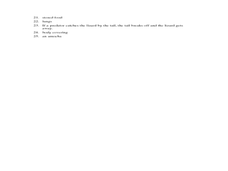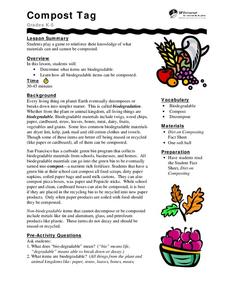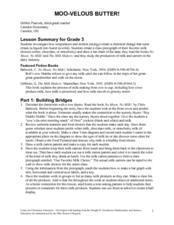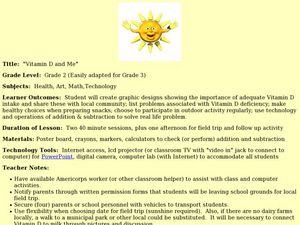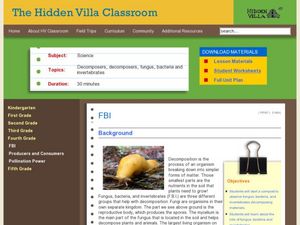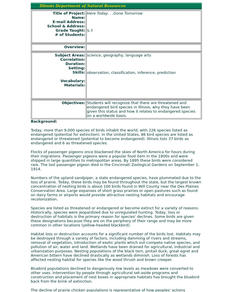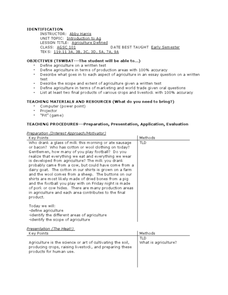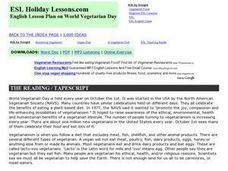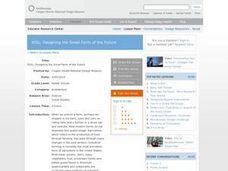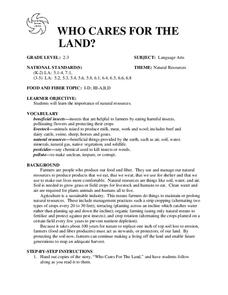Curated OER
The Little Engine that Could Mini Unit Plan
The best part about teaching little ones is setting up fun, thematic learning stations. Here is a full day of activities that all relate to the story, The Little Engine that Could. Included are six different activities that cover art,...
Education World
Edible Resource Maps!
Young scholars discuss resource maps and examine examples from library resources. Working in groups, they create edible resource maps by drawing examples, such as popcorn on the border of Iowa and Nebraska. Then they use cookies in the...
Curated OER
Fifth Grade Science Assessment
In this science assessment worksheet, students complete a 25 question multiple choice quiz about biology. Plant and animal anatomy is included.
SF Environment
Compost Tag
Composting is a great way to get children involved in recycling. First, they discuss how biodegradable products decompose to make compost. Then, they talk about what can and cannot be composted. They play a game similar to around the...
SF Environment
Sort and Color!
Sorting is a very important skill that can be used in math and even science. Learners get familiar with some environmentally friendly vocabulary terms as they practice separating objects that can be recycled from those that can't. They...
Curated OER
Moo-Velous Butter!
Third graders investigate how temperature and motion (energy) create a chemical change that turns cream ( a liquid) into butter (a solid). They create a class pictograph of their favorite mils choices (white, chocolate, or strawberry)...
Curated OER
Foreign Economics
Why do so many countries export cars? Economists examine this and other foreign economics principles through this introductory learning exercise. A brief text explains international trade, then lists the top 11 leaders in global trade,...
Curated OER
Vitamin D and Me
Students create a graphic organizer showing the importance of Vitamin D intake. In this Vitamin D lesson plan, Students list problems with Vitamin D deficiency and create poster boards in small groups. Individually, students will create...
Curated OER
FBI
Fourth graders experiment with compost. In this Science lesson, 4th graders begin a worm compost as well as an outdoor compost. Students discuss decomposition.
Curated OER
Is It Ethical to Eat Meat?
Have your class join a blog about whether or not eating meat is good for you. They'll read several passages regarding meat processing and consumption, then they post what they think. There are six critical-thinking prompts to help them...
Perkins School for the Blind
Grocery Shopping
Grab those reusable bags, it's time to go shopping! Intended to foster independent living skills in learners with visual impairments, the lesson covers several topics related to grocery shopping. They start by planning a meal, reading...
Dickinson College
Test Your Best Jeopardy
Make test-taking fun with a Jeopardy game that reviews the skills and stretegies needed to have a successful experience. Categories include test readiness, brain blockers, test strategies, tests pitfalls, and anxiety reducers. Learners...
Curated OER
Producer to Consumer Fun
Students explore the world of economics. In this economics lesson, students examine literature and participate in discussions to learn about production and consumption. Students are encouraged to visit a farm or tour a factory to...
Curated OER
Breakfast Boosts Brainpower
Students examine the importance of eating a balanced breakfast. In this healthy eating lesson students identify examples of a healthy breakfast and compare the characteristics of people who do or do not eat breakfast.
Curated OER
De"compost"ition
High schoolers develop an understanding of the decomposition process and the parameters which influence the rate at which it occurs.
Curated OER
Here Today. . .Gone Tomorrow
Students observe that there are threatened and endangered bird species in Illinois, why they have been given this status and how it relates to endangered species on a worldwide basis. they participate in the Project WILD "Oh, Deer" or...
Curated OER
Agriculture Defined
Open your Agriculture 101 course with a lesson on defining agriculture. Guide your class with thought-provoking questions and discussion. Give them time to play the card game, "Pit" in order to experience commodity exchange. This is a...
Curated OER
Milk: A Practical Application
Explain the coagulation and coalescence processes associated with milk protein and cheese. List the components of milk and explain how each component is dispersed in the milk. Describe what happens when milk protein is coagulated Discuss...
Curated OER
Essential Nutrients - Daily Guides
List the recommended dietary guidelines and explain their function and implementation. (The guidelines are listed below) National Standards 14.3.1 Aim for fitness Aim for a healthy weight Be physically active each day
Curated OER
The Fable of Franny And Her Fabulous Fainting Goat
Mix the art of reading comprehension with the skill of telling time. Children in grades two and three will discuss the importance of goats throughout history based on the provided background information. They'll create cute goat clocks...
Curated OER
World Vegetarian Day
In this World Vegetarian Day worksheet, students complete activities such as read the passage, match the phrases, fill in the blanks, choose the correct word, multiple choice fill in, correct the spelling, put text in correct order,...
Curated OER
Life In the Soil: Home Sweet Home: Red Worms
In this soil worksheet, learners complete 2 pages about the importance of soil in plant growth. Students read about red worms and answer 2 questions about composting. Learners fill out a chart with their observations of plants planted in...
Curated OER
Soil, Designing the Small Farm of the Future
Learners examine the history of farming. In this environmental farming lesson plan, students explore the web and complete a variety of activities in order to understand the necessity of local, sustainable, and small farms for the future....
Curated OER
WHO CARES FOR THE LAND?
Students explore the importance of natural resources. They are given copies of the story, "Who Cares For The Land," and students follow
along as the teacher reads it. Students identify the key points in the story. (Soil, water and air...




